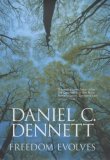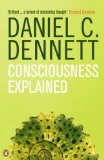2008 is the year of Heroes
This summer, I met two of my heroes, Eli Goldratt and Neil Armstrong, in Paris.
Yesterday, I met another hero: Daniel Dennett. Professor Dennett gave a talk entitled “Considering Consciousness” at Antwerp University. Professor Daniel D. Hutto provided a counterpoint to the presentation.
What is consciousness?
Dennett used the metaphor that “Consciousness is Fame in the Brain”.
Lots of stuff is going on all the time in our brain. Information is changed, updated and revised (the “multiple drafts” model), distributed in time and space. Some of this activity wins a competition for attention and becomes “famous”. That’s when we become conscious of the activity.
We can make a clear distinction between conscious and unconscious, but we can’t pinpoint an exact time when something becomes conscious. A thought becoming conscious is like a “speciation event” (the start of a new species): the moment when it happened only becomes important in retrospect. An observer who was there at the moment it happened wouldn’t notice anything very special. Consciousness isn’t an all or nothing phenomenon. Are animals conscious? A lot less than humans. Is a baby conscious? Less than an adult and in a more limited way. As it grows it becomes more conscious and conscious of more.
The Cartesian Fallacy
Dennett warns us against the seductive “Cartesian Theater”, the idea that there is some special place (and time) in the brain where consciousness exists. As if there is some homunculus in the brain that is conscious and that watches and controls all the unconscious processes. But then, how can we explain that consciousness in terms of unconscious processes? We’d be stuck in an infinite regress. Subtle versions of this idea are very common.
Another common fallacy is to confuse the time of the represented with the time of representing. For example, when we hear the sentence “Bill arrived at the party after Tom”, we will first represent Bill, then Tom. But our representation indicates that Tom arrived before Bill. Our mind has clever tricks to deal with time-related issues. Signaling and processing in our bodies and brain is rather slow, so our brain will adjust the ‘timestamp’ of information received by taking into account the expected ‘travel time’ of the signal. Neurological experiments can exploit this adjustment so that it seems to the subject as if actions happen before they’ve initiated them.
When Dennett explains these fallacies, they seem pretty obvious. Yet, only a few months ago I read an article by a philosopher who claimed that a neurological experiment that ‘cheated’ the brain into thinking that actions had been performed before they had been decided showed that people have no free will. More on free will later.
The Heterophenomenological Method
Heterophenomenological Method is a big word to describe a method of enquiry where when someone tells us “It feels like <this> is happening in my brain” we certainly accept that this is how it feels. That doesn’t mean it actually happens that way. Another metaphor: when we investigate consciousness, we should act like a Martian investigator, looking for the objective mechanisms behind the subjective report.
Daniel Hutto questioned, with a presentation on the edge of “Bimbo slides“, whether Martians could really investigate us if they were devoid of a human body like the Martians in Wells’ “War of the Worlds”. Is the Heterophenomenological method really feasible? Hutto proposed to relax the requirements, because experience is crucial to understand.
Who’s “I” ?
Someone asked if consciousness could arise in a distributed “organism”. Dennett replied it could if the architecture was right. In many ways, we are a “colony” of many organisms. After the “Wisdom of the Crowds“, can there be a “Consciousness of the Crowds”? “Fame in the Crowd”…
Another question that arises is: what is “I”? Where is it? Is it the conscious part of me, like the Cartesian Theater would suggest? Or is the I more encompassing, including unconscious processes and the body?
I know how it feels it works.
About heroes
This summer, in a discussion about heroes, I realised that the people I admire have one thing in common: they’ve made me see things in a different way.
“The real voyage of discovery consists not in seeing new landscapes, but in having new eyes.” — Marcel Proust



[…] Acceptance Criteria [] Is there a steady stream of new posts to keep me reading (at least one per month)? [] Is the information authentic (based on personal experience and perspective)? [] Does the blog give me new ideas? [] Does the blog help me develop my existing ideas? [] Does the blog help me look at my bigger picture? […]